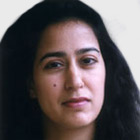Amin Maalouf, winner of the 1993 Prix Goncourt, witnessed a slaughter at the outbreak of Lebanon’s civil war in 1975. Then a journalist fearful for his wife and child, he sensed that “if somebody had given me a weapon, maybe I’d have become a murderer”. The realisation drove him as a refugee to Paris, where he was last year awarded the Order of Merit for building bridges between east and west.
The Disoriented, published in French in 2012 and at last in Frank Wynne’s assured English translation, is a profound reckoning with that existential choice, in the words of the protagonist, Adam, to leave a country in turmoil in order to “ensure my hands were clean”. Alternating between a third-person narrative and Adam’s journal entries and emails, this deeply engaging novel enacts through its characters Adam’s “ceaseless dialogue” with his conscience. It follows Maalouf’s superb memoir Origins (2008), and forms an enjoyable fictional counterpart to the essays of Adrift (2020) as its hero ricochets between nostalgia for a lost Levantine Eden and aversion to a world of ossifying divisions. Set with dramatic irony in early 2001, the novel is partly an elegy for a world before September 11 – before the pressure to take sides between putative warring identities was ramped up towards a cataclysmic clash.
It spans 16 days as Adam, a historian aged 47 who is now “more French than the French”, returns to his unnamed homeland after 25 years, a decade after the end of the civil war. He has been called to the deathbed of an estranged friend, Mourad. Arriving too late in the capital – recognisably postwar Beirut – he humours Mourad’s widow, Tania, by orchestrating a reunion of their tight-knit university friends. As they assemble over mezze and champagne in a belle époque mountain hotel amid Aleppo pines, grudges resurface, ardour rekindles and bitterness erupts between those who left and those who stayed.
Adam judges his former friend to have betrayed the values of their youth. When Mourad’s Ottoman mansion, where the students used to gather, was seized by the militia, he enlisted a rival warlord to recover it – a Faustian pact that sealed his “moral drift”. The local term for nouveau riche is “war wealthy”. Adam disdains Mourad’s political ascent to ministerial status and self-enrichment in a government of reconciliation that pardoned the warlords. This happened in Lebanon, a “capital of amnesia” whose controversial postwar amnesty 30 years ago helped spur the October revolution of 2019. But the novel’s dilemmas reverberate widely, from Spain to South Africa to Argentina – where Adam’s partner, Dolores, is from.
For Adam, “impunity is as pernicious as injustice”. Yet tensions between memory and forgiveness, justice and grace, run throughout the novel. Tania challenges Adam’s claim to moral superiority. “Those who stayed got their hands dirty to preserve a country for you,” she berates him at her husband’s funeral. Adam wonders if he took the coward’s way out. “After the first massacres, I left, I ran away,” he notes in his journal. “From afar, it is easy to say no.”
The moral maze becomes more complex as Adam has an affair with hotelier Sémiramis, whom he was too shy to court when they were students; a lifelong regret. This adultery has permission from the absent Dolores, the two women conspiring behind his back. When he learns of their pact – “‘Lend him to me, and I’ll give him back.’ As though I’m a toy or … an outfit” – he is unsettled. But as he and Sémiramis stray beyond these lines, their efforts to limit the pain caused by infidelity proving unequal to the passions unleashed, their foundering good intentions parallel wartime’s slippery moral slopes.
Adam’s nostalgia for his youth – for friends with a “glass in hand and revolution in our hearts” – is as much for his beloved Levant’s porous borders and “subtle identities”. His scattered friends, Muslim, Christian and Jewish, are a microcosm of the civilisation he mourns. Their lives reflect Arab history, from the Cairo-born war widow Sémiramis, and Bilal, a budding poet cut down by a shell, to Naïm, who had the “misfortune to be born both Arab and Jew” and left for Brazil without telling his friends.
While the title alludes to being wrenched from the east, The Disoriented also signifies the universal loss of a moral compass. For Adam, “principles are ropes, they are moorings; break them and you are free, but like a huge helium-filled balloon … rising towards nothingness”. A Parisian whose whispered endearments are still in Arabic, he finds on his journey that “every evening I rediscover the reason why I left my native land; but every morning I also rediscover the reason why I never truly abandoned it”. The open ending suggests a world perilously poised between hope and doom. Yet, clinging to the “islands of Levantine delicacy” so beautifully captured in this novel affords Adam – and the reader – a fragile consolation.
• The Disoriented, translated by Frank Wynne, is published by World Editions (£12.99).











